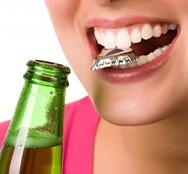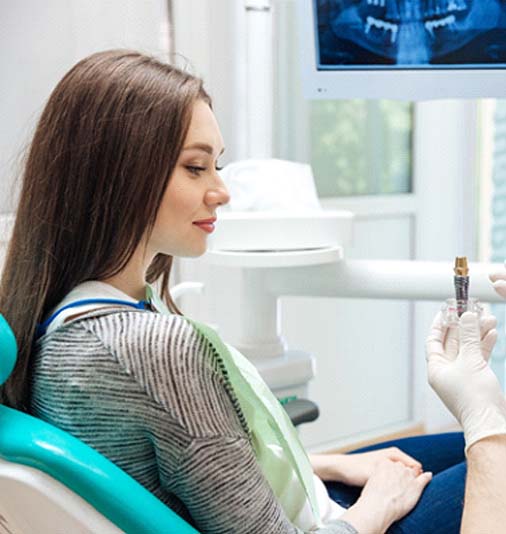Dental Implants – Salt Lake City, UT
Recover Your Smile, Recover Your Confidence

Missing teeth can cause problems in just about every aspect of someone’s life, causing difficulties when it comes to eating, speaking, and even smiling. For those who are ready to permanently put their tooth loss behind them and get a long-lasting, natural-looking solution, Dr. Wood and Dr. Long are proud to offer dental implants in Salt Lake City, UT. These prosthetics practically turn back the clock and allow a patient to look and feel like their teeth never went missing in the first place. And, thanks to our periodontal office’s expertise and commitment to quality, patients can look forward to a seamless and comfortable process that ends with a gorgeous, healthy smile.
Why Choose Utah Implants and Periodontics for Dental Implants?
- Our Specialists Place Dental Implants In-Office
- Replace Any Number of Missing Teeth for a Lifetime
- Calming Dental Sedation Available for Optimal Comfort
What are Dental Implants?

A dental implant is a small titanium post that is placed into the jawbone to mimic the root structure of a tooth. Because titanium is biocompatible, the surrounding bone actually bonds to it just like a real tooth through a process called osseointegration. Once this is complete, a new crown, bridge, or denture can be attached to the implant to bring back the visible portion of the tooth/teeth.
The 4-Step Dental Implant Process

The process of receiving dental implants takes place over multiple months and several visits. Because of this restoration’s long-term benefits, you can trust that they are well worth the wait! After all, dental implants have the potential to last a lifetime with the proper care and maintenance. We also handle the implant placement process ourselves! Every person’s experience looks a little bit different, but it will include the following steps.
Initial Dental Implant Consultation

The first step when it comes to getting dental implants is to attend a consultation with us. During this time, we will examine your smile and surrounding facial structures. This will allow us to determine whether or not dental implants are an ideal option for you, as well as where and how the implants should be placed. Some people need to undergo preliminary treatments before they can get dental implants. This includes bone grafting, gum disease treatment, and tooth extractions. Once these treatments are complete, we can move on to planning the rest of your implant treatments. We’d be happy to walk you through the process, timeline, and cost.
Dental Implant Surgery

Dental implant placement surgery is relatively straightforward. After we numb your mouth with a local anesthetic, a small incision will be made into the gum tissue to access your jawbone. The implants will then be placed at precise locations and angles. Lastly, your gums will be closed, and protective caps will be placed over the dental implant posts to keep them safe during the healing process.
Dental Implant Osseointegration & Abutment Placement

Over the next 3 to 6 months, the fusion process will begin to take place between the implant and jawbone. This process is known as “osseointegration.” This allows for your implants to have a sturdy foundation so that your replacement teeth will stay firmly in place. Once this process has been completed, we can place a metal abutment on top of your implant.
Delivery of Dental Implant Restorations

A few weeks after your abutment has been placed, your restoration should be ready to go. You can return to our practice where you will receive your new crown, bridge, or denture, depending on the number of teeth you are replacing. At this point, we will ensure that your bite is comfortable, and we you will be sent on your way to reap the benefits!
Benefits of Dental Implants

Over half a million dental implants are placed every year, and it’s easy to see why that’s the case. Not only are they incredibly natural-looking, but they provide a wide range of benefits that traditional solutions (i.e., dentures and dental bridges) simply cannot. This popular method of tooth replacement can drastically improve your confidence, health, and overall quality of life. If you’d like to learn more about their fantastic unique advantages, click on the button below.
Day-to-Day Benefits

If you’re going to replace your missing teeth, it only makes sense that you’d want something that’ll allow you to perform everyday tasks with ease. With dental implants, you can eat, speak, and smile just like you would with natural teeth. You can look forward to the following day-to-day benefits:
- Boost self-confidence. Traditional bridges and dentures are notorious for slipping out of place, but that is never a concern with dental implants because they are rooted within thick bone just like real teeth. As a result, you can eat and talk with complete confidence!
- Easier maintenance. Dental implants don’t require a complicated oral hygiene routine. You can simply care for them as you would natural teeth, which means brushing twice a day and flossing daily.
- Ability to eat anything. There are almost no dietary restrictions with dental implants thanks to their unmatched strength and durability.
Health Benefits

Dental implants can do more than improve your appearance – they offer some incredible health advantages! These include:
- Protection for natural teeth. If you have gaps in your smile, your teeth may shift to fill in those empty spaces. Fortunately, dental implants can help keep every member of your grin exactly where it belongs.
- Jawbone preservation. Bone loss is a common side effect of tooth loss, but implants are the only replacement that is proven to stop and even reverse this process. This lowers the risk of future tooth loss and helps a patient maintain a more youthful facial shape.
- Improved overall health. Studies have discovered a correlation between tooth loss and an increased risk of multiple diseases. Because implants are similar to natural teeth, it’s safe to assume they can help lower such risks!
Long-Term Benefits

By choosing to restore your smile with dental implants, you can look forward to many long-term benefits:
- High success rate. Dental implants have an impressive success rate of about 95% even 20 years after they’ve been placed!
- Long-lasting results. With proper care and maintenance, Dental implants have an impressive 35+ year lifespan.
- Maintain a youthful appearance. Since implants stimulate the jawbone, they help prevent the sunken aged look that often comes with tooth loss.
Who Dental Implants Can Help

Almost any adult with missing teeth can be an excellent candidate for dental implants. All that is required is a sufficiently healthy mouth as well as enough jawbone structure to support the titanium posts after they are surgically placed. If a patient isn’t ready for implants yet, they can usually receive them later after they undergo restorative treatments or bone grafts at our office. At your consultation, the team at Utah Implants and Periodontics will gladly help you understand your oral health as well as which restoration can be right for you.
Who Is a Good Candidate for Dental Implants?

An excellent dental implant candidate will meet the following three criteria:
- Suitable overall health: You’ll need to be well enough to safely undergo minor surgery to receive dental implants.
- Excellent oral health: Oral infections like gum disease and tooth decay can compromise a new or existing dental implant. These issues will have to be resolved before any restorations can be placed.
- Adequately strong jawbones: Your jaws will need to be strong enough to support dental implants, so we may need to perform bone grafts if you’ve gone a long time without replacing your lost teeth.
Almost any healthy adult can be an excellent candidate for dental implants, and we’ll be happy to perform any preliminary treatment needed to help get you to that point. Once you’re ready, we’ll be happy to design your customized treatment plan.
Missing One Tooth

Rather than filing down perfectly healthy teeth so they can support a bridge, we can simply position an implant and mount a customized crown on it to replace a single tooth. This will create a restoration that can exert maximum chewing power and last for decades if it receives proper care.
Missing Multiple Teeth

Multiple implants can be used to provide a strong foundation for either a partial denture or bridge. Not only are these prosthetics stronger than traditional ones, but they also don’t rely on the nearby teeth and gums for support, which makes them much more comfortable.
Missing All Teeth

A full denture can be anchored to the jawbone using just 6-8 implants placed along the dental arch. Implant dentures provide a much sturdier fit than removable ones, so they enable a patient to eat many foods that were traditionally considered “off-limits” for denture wearers such as tough meats and fibrous vegetables. These devices won’t slide around either, which can prevent denture sores and other discomforts.
All-on-4 Implant Dentures

The All-on-4 procedure allows us to replace an entire row of teeth in a single appointment. Just four implants are positioned at strategic places in the jaw to maximize the device’s leverage within the existing bone structure, and then they are immediately fitted with a lifelike denture. This procedure is not only relatively fast, but it also allows many patients to forgo a bone graft before getting implants.
Understanding the Cost of Dental Implants

In order to provide the best outcome possible, the dental implant procedure is always personalized based on a patient’s specific needs. As such, the cost can vary quite a bit from person to person. The number of implants needed, the type of restoration that will be supported, and the need for preparatory treatments like extractions or bone grafts can all influence the final cost. We’ll go over any pricing information at your consultation and also discuss how we can use your insurance and financing to make the treatment affordable.
Preliminary Treatments & Dental Implant Surgery

In many cases, setting up dental implants for success requires a little prework. Bone grafts, gum disease treatment, or tooth extraction may be necessary, which will raise the total amount due for your complete smile.
The pricing of the surgery itself will increase with more implant posts you receive. If you have sedation during the placement procedure, the total will also go up, but this makes the process much more comfortable and smoother for you, making it well worth the extra cost.
The Parts of Your Dental Implant

Just as different car brands and models have varying parts, certain types of dental implants can come with parts costing unique amounts. Dental implants consist of three parts: the post, the abutment, and the restoration. Once we have decided on a treatment plan for your unique case, we can break down the pricing of the parts based on your needs and goals.
Why Dental Implants Are Worth the Money

Although the upfront cost is higher for dental implants than for traditional dentures or bridges, consider your long-term expenses. Normal dentures and bridges must be frequently replaced because the jawbone is constantly changing. Over the years, you must pay for these replacements. When you add up these instances over time, you may very well find that you’re spending more on these prosthetic teeth than you would on dental implants, making them a wiser long-term investment.
Does My Dental Insurance Cover Dental Implants?

Most dental insurance plans do not include dental implants in their policies; however, there may be parts of treatment that are covered. For example, certain preliminary treatments like gum disease treatment are partially covered by insurance. The restoration(s) you will receive will likely also be partially paid for by insurance, reducing your out-of-pocket cost.
Making Dental Implants Affordable

With or without insurance, the cost of implant treatment may be such that you don’t want to, or can’t, pay for it all upfront. Fortunately, we work with CareCredit, a financing company that offers low-interest loans. We can guide you through the application process and enable you to pay for your restored smile over months with smaller payments.
Dental Implants Post-Op Instructions

Although dental implants offer one of the most reliable solutions for rebuilding lost teeth, you’ll need to make sure to properly care for them to make the most of them, especially during recovery. The good news is that our team will provide you with specific guidelines on how to maintain your smile to ensure successful results. Keep reading to learn more about our dental implant post-op instructions so you can enjoy your brand-new restoration(s).
What to Do Directly After Dental Implant Surgery?

Once you’ve undergone your procedure, you’ll need to make certain that the blood clot forming around the surgical site remains undisturbed. This means you should refrain from touching the area with your tongue or fingers, that way, you can heal correctly and give your dental implants a chance to fuse to your jawbone effectively. You should also avoid smoking or chewing tobacco as well as drinking through a straw, as the suction can easily ruin the blood clot. Be sure to also get plenty of rest so you can heal properly.
Common Side Effects When Recovering from Dental Implant Placement

While you shouldn’t experience pain during your treatment process, you might notice some soreness and sensitivity during your healing period. You may even experience some intermittent bleeding and swelling, which should go away after a while. Notify our team if these symptoms persist or get worse so that we can help. Meanwhile, manage your side effects by implementing the following:
- For swelling, use a cold compress on the side of your cheek.
- If you notice bleeding, apply gentle pressure to the affected area with clean gauze.
- Take over-the-counter or prescribed pain relievers to alleviate discomfort.
Your Diet After Dental Implant Surgery

Since your dental implant(s) will need to fuse properly to your jawbone, the last thing you want to do is disturb the surgical site. This means you’ll need to avoid eating anything that requires excessive chewing. A soft-food diet will be your best option, which should include various food choices that are easier for your smile. These can include mashed potatoes, yogurt, pudding, scrambled eggs, and even ice cream.
Post-Op Health & Oral Hygiene

Maintaining a clean mouth will be fundamental to your recovery, so you’ll want to continue keeping your smile healthy with safe and effective teeth-cleaning habits. Here are several tips for your oral hygiene routine:
- Brush twice a day the day after your procedure, but be gentle when cleaning near the surgical site.
- Rinse your mouth with salt water at least 2-3 times daily, especially after eating. Pour the water from your mouth into the sink; don’t spit it out.
- Avoid using mouthwash consisting of alcohol, which can cause discomfort.
What to Do After Your New Teeth Are Attached

After healing completely and your dental implant is correctly fused with your jawbone, you’ll return to us to receive your final restoration. This process might involve some slight sensitivity in your gums, but you can minimize your symptoms with pain medications. If you notice any bleeding or swelling after your new tooth is attached, let us know so we can help. Once everything is correct and you’re satisfied with your results, you’ll be free to enjoy your new and improved smile!
Maintaining & Caring for Your Dental Implants

Dental implants are impressive in a lot of ways, but they’re not invincible! Without proper maintenance and care, you risk developing oral complications like gum disease or infection that could result in implant failure. Plus, a little effort goes a long way. Give your dental implants some mindful attention, and they could last well beyond their average lifespan. To talk with one of our professionals about dental implant care in Salt Lake City, give our office a call.
Make Oral Hygiene a Priority

Good oral hygiene is essential for maintaining both healthy teeth and healthy tissue. By brushing twice per day, flossing at least once daily, and rinsing your mouth between meals, you keep harmful bacteria from building up to dangerous quantities.
Conditions like gum disease, tooth decay, and oral infection are a direct result of excessive bacteria accumulation, and will wreak dental havoc by attacking your enamel, gums, and possibly even your jawbone. Without strong gums or bone to lean on, your dental implants – and natural teeth! – will fall out. Needless to say, it’s better to spend a few extra minutes in front of your bathroom mirror taking care of your oral hygiene!
Eat a Healthy Diet

Sugar and starches are hard to pass up. After all, they’re admittedly pretty tasty. However, poor nutrition can weaken your immune system or result in vitamin deficiencies, which will make it harder for you to fight off oral diseases and maintain healthy dental implants. Sugar and starch in particular speed up bacterial growth.
Enjoying your favorite treats and snacks from time to time isn’t going to cause a dental apocalypse. Instead of making them your go-to munchy, though, fill your home with fruit, vegetables, calcium-rich dairy, and lean proteins. There are fun ways to eat these healthy alternatives, and their nutritional content will help your body help you by supporting your dental implants.
Break Bad Habits

Whether your teeth are made of porcelain, resin, or natural enamel, biting down on hard substances or using tobacco products will wear them down faster. Nicotine and other chemicals present in tobacco slow healing, cause deep staining, and aggravate existing infections and injuries. Nail-biting, pencil-nibbling, ice-crunching, or bottle-opening with your teeth, on the other hand, can cause chipping or cracking.
Bad habits are hard for anyone to break. In the long run, though, doing so is in your best interest, and will help your dental implants last longer. Don’t hesitate to lean on support networks or loved ones for assistance in conquering harmful compulsions.
Protect Your Dental Implants

This means wearing a mouthguard while playing sports or engaging in high-impact, high-risk activities, and wearing a nightguard to cushion excessive pressure from teeth-grinding. Know that these devices can be custom fitted for maximum comfort. Inserting an oral appliance to protect your dental implants will be far less dramatic than damaging an implant or experiencing a dental emergency!
Schedule Regular Dental Checkups

If all of that sounds daunting, don’t worry. Your dental implant team at Utah Implants & Periodontics won’t leave you high and dry! We’re available to address your questions and concerns, and if you schedule regular checkups with us every six months, we can take a look at your implants to monitor their condition. By giving them a thorough once-over at even intervals, we can often catch any impending complications early, before they become serious problems. We’ll do our part to ensure you can enjoy reliable dental implants for years to come.
Dental Implant Failure & Salvage

Dental implants are the best tooth replacement option out there. They replace the roots of the missing teeth, allowing for a wide array of benefits that you can’t achieve with dentures or dental bridges. One of the most notable ones is the dental implant success rate of over 95%! That being said, failure is still possible. It’s important that you keep an eye out for signs so that they can be addressed sooner rather than later. If you think there may be an issue with your dental implant, contact us right away! We may be able to save it with dental implant salvage treatment.
Learn More About Dental Implant Failure & Salvage
Dental Implant FAQs

Getting dental implants is a major investment in not only your smile, but also your confidence, health, and overall quality of life. Still, our team at Utah Implants & Periodontics understands that you may have some questions you need answered before beginning the treatment process. That is perfectly normal! Dr. Wood and Dr. Long will thoroughly explain your treatment in easy-to-understand terms, but ahead of your visit, it may help to read the answers to a handful of frequently asked questions about dental implants in Salt Lake City.
Does Getting Dental Implants Hurt?
Before the procedure begins, Dr. Wood and Dr. Long will make sure that you’re 100% comfortable. To that end, he’ll numb your mouth and jaw with local anesthetic, and he’ll most likely also administer sedation to calm your nerves. Additionally, the jawbone doesn’t contain very many nerve endings that can sense pain. Therefore, dental implant placement itself shouldn’t hurt. Your mouth and jaw may be sore for a few days afterward, but our team will supply you with post-op guidelines meant to minimize discomfort.
How Long Does It Take to Recover from Dental Implant Surgery?
The exact timeline can vary; it may take longer to recover from All-on-4 surgery than it would if you were getting a single implant, for example. With that being said, most patients are able to resume their normal routines the day after dental implant surgery, particularly if their jobs are mostly sedentary. If your job involves physical activity, you may need to take the next two or three days off. Vigorous exercise could delay healing by diverting blood away from the implant site. Post-op bleeding should slow down and stop after about two days, and swelling should cease after about three to four days. Any soreness and general discomfort following your procedure should be gone within a week at most. If that’s not the case, please call your implant dentist in Salt Lake City right away.
Is There Anything I Shouldn’t Eat with Dental Implants?
While your implants are integrating with your jawbone, you should avoid eating foods that are difficult to chew. Placing too much pressure directly on the implant may prevent it from properly fusing to the bone. After osseointegration is complete, however, you should feel free to enjoy practically any food you would like. Keep in mind that particularly sticky or chewy foods can dislodge or loosen the restoration on top of your implants, so be careful with such items.
Am I Too Old to Get Dental Implants?
As long as your jawbone has finished developing (which usually occurs by the time a person has reached their mid-twenties), your age shouldn’t influence your candidacy for dental implants. With that being said, patients of a certain age may be more likely to have additional health issues that could complicate dental implant treatment, such as gum disease, bone loss in the jaw, or diabetes. Dr. Wood and Dr. Long will be sure to review your medical history in detail and take care of any preliminary procedures or precautions he needs to take before placing dental implants.
Periodontal Therapy Surgical Periodontics Sedation Dentistry View Our Services
